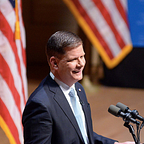The Housing Innovation Lab: A Good Idea That Just Got Better
I met Darnell last week at a coffee hour in Jamaica Plain. He’s a Boston Public School teacher. He wants to live close to the school where he works, because less time commuting means more time with students. But, he’s having a tough time in this market.
I get it.
I bought my first home through help from a Homebuyer 101 class, and I remember clearly what it was like to be a first time homebuyer. It’s exciting, but it can also be frustrating.
I met Andrea at the same coffee hour. She’s one of Boston’s wonderful seniors, who has been living in her home for 30 years. She’s retiring next year and wants to stay in this neighborhood she loves, but she’s worried about how she will pay for the upkeep of her home when she retires next year.
These are real people, with real challenges. We’re working hard to help Darnell, Andrea and all of the other residents in need of more housing options that they can access.
Boston is an increasingly exciting place to live, but this means more demand on our housing stock. Our housing plan calls for the creation of 53,000 new units by 2030 to meet this growing need. But the cost to build is continuing to rise. We need to work together across sectors to come up with new materials, new methods, and new policies to develop differently.
We are making great progress on our 2030 housing goals, with 13,000 new units of housing already on line. But there will always be Bostonians who need a little extra help to get on their feet. Boston is leading the way in affordable housing creation, with nearly 20 percent of our housing stock dedicated to those with a lower income. With federal funds for the creation of new affordable units and the preservation of existing units in jeopardy, we need to think outside the box and come up with ways to fund differently.
And our population isn’t only growing — it’s also changing. Household sizes are smaller, and the definition of a household itself is evolving. Lifestyles and desires are also shifting. We are working from home more often. We aren’t interested in owning as many things. We are interested in sharing spaces and things more frequently. All of these shifts mean that the housing stock that was built for Boston’s population in the 1950s is no longer meeting our needs. We need to expand options in our housing stock and design differently.
This is why, with this year’s budget, I’ve decided to permanently fund the Housing Innovation Lab to test new ways to develop, fund, and design differently to ensure all Boston residents have an affordable place to live.
The Housing Innovation Lab is helping us find new ways to create housing by first learning about what Bostonians need and want. Lab members have gone into people’s homes to understand what drives their housing decisions. They’ve talked to potential and recent homebuyers about their experiences in the market. And they get out on the street to talk to hear your housing experiences as often as they can.
All of these stories feed new ideas, helping to assess the potential impact and feasibility. Right now, for example, they are exploring new living arrangements that could pair seniors with renters, helping people like Andrea stay in their homes. They’re also looking at new programs that could help potential homebuyers like Darnell buy their first home.
The Lab explores many ideas, but only a few — the ideas with the greatest potential for impact and feasibility — make it to the experiment phase. Currently, the Lab is testing a density bonus, which allows developers to build more units in exchange for making more of those units restricted to people with lower incomes.
The Lab has completed several experiments that they’re now evaluating and expanding. For example, last fall, they toured a 385 sq foot unit throughout six neighborhoods to gauge resident interest in smaller living, and they ran a design and build competition in which development teams proposed well-designed and affordable compact units for a city owned parcel. They are expanding on lessons from both of these experiments to design a compact living policy for the city that would allow for smaller unit sizes.
Boston is a hub of innovation in business, medicine and technology. The Housing Innovation Lab brings that spirit of exploration and experimentation to the most important issues facing our city: ensuring our residents have a home in Boston.
The Housing Innovation Lab is always looking for new ideas. Sign up to chat with them during their weekly office hours.
